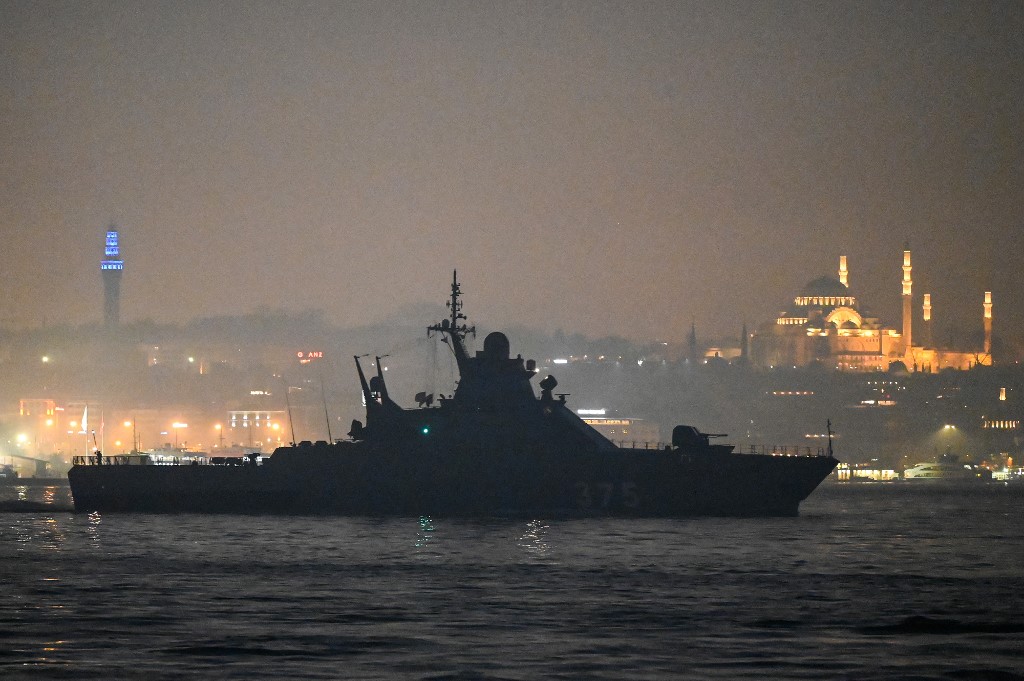As reported by Reuters news agency, citing images obtained from the Israeli satellite company ImageSat International (ISI), the ship Sparta II transported S-300 long-range air defense system missiles dismantled in Syria from the Syrian port of Tarsus to the Russian port of Novorossiysk on Aug. 20, 2022. Sparta II is operated by Oboronlogistics LLC. This Moscow-based company’s main objective is meeting the Russian Ministry of Defense’s transportation needs for “military and special goods.” The ship was specifically placed on the U.S. Treasury’s Office of Foreign Assets Control (OFAC) sanctions list. The crew is civilian, while the cargo is often military.
Russia is prevented from sailing its warships through the Dardanelles and the Bosporus because Turkey has closed the straits to warships of the belligerent countries of the Russia-Ukraine conflict under Article 19 of the Montreux Convention. However, Russia used the Sparta II to transport dismantled S-300 missiles from Syria to reinforce air defenses in the Crimean Peninsula and support the war effort.
According to Reuters, the ISI obtained images indicating the presence of the S-300 anti-aircraft battery in Masyaf, Syria in April as well as the empty site left behind on Aug. 25 after the hardware was transported to the port of Tartus. Separate images showed the battery components on a dock in Tartus between Aug. 12 and 17. By Aug. 20, they had disappeared, and ISI determined that they had been transferred to a Russian ship, the Sparta II, which left Tartus for the Russian port of Novorossiysk, an important naval base close to the Kerch Bridge, which connects mainland Russia to the Crimean Peninsula, as Russian forces in Crimea come under increased drone attack. However, according to Oboronlogistics, Sparta II had a cargo of olive oil on board.
On Aug. 29, 2022 Turkish Ambassador to Ukraine Yağmur Ahmet Güldere was summoned to the Ukrainian Ministry of Foreign Affairs. Deputy Foreign Minister Mykola Tochytskyi expressed to the Turkish ambassador the concern of the Ukrainian side in connection with the available information on the transport of S-300 missile systems from Syria to Russia via the Bosporus Strait by the Sparta II, chartered by the Russian Ministry of Defense. The Turkish Embassy was handed a note verbale from the Ministry of Foreign Affairs on the issue.
Tochytskyi drew the attention of the Turkish ambassador to the fact that, according to the provisions of the Convention regarding the Regime of the Straits of July 20, 1936, the specified vessel falls under the definition of a warship for the purposes of the convention. He requested that the Turkish side provide official information regarding the cargo that was transported by the Sparta II through the Bosporus as well as the measures taken by Turkey to fulfill the provisions of the convention and prevent further escalation of the Russian-Ukrainian war.
The deputy minister expressed the hope that Turkey would strictly adhere to its decision of Feb. 28, 2022 to close the straits to Russian warships during the Russian-Ukrainian war in line with the consistent position of Turkey to support the sovereignty and territorial integrity of Ukraine in its internationally recognized borders.
As can be seen from the statements of the Ukrainian Foreign Ministry, the Ukrainian side claims that the ship is not a merchant vessel but an auxiliary naval warship, citing the cargo of Sparta II and its links to the Russian Ministry of Defense. Under the Montreux Convention, ships are divided into merchant vessels and vessels of war (warships). Article 7 of the convention states that the term “merchant vessel” applies to all vessels that are not covered by Section II (which defines the vessels of war).
In Montreux Convention Annex II, auxiliary vessels are naval surface vessels, the standard displacement of which exceeds 100 tons (102 metric tons), which are normally employed on fleet duties or as troop transports, or in some other way than as fighting ships and which are not specifically built as fighting ships.
Sparta II cannot be considered an auxiliary naval warship by this definition. Since Article 7 considers all vessels other than warships to be merchant vessels, the Sparta II is a merchant vessel under the Montreux Convention, regardless of the cargo it carries. According to the convention, merchant vessels shall enjoy complete freedom of transit and navigation in the straits under any flag, with any kind of cargo and without any formalities. Therefore, Turkey has no right to restrict the passage of merchant vessels unless Turkey is at war or the passage threatens its peace, good order or the security of the country.
However, one point should be emphasized here. The Montreux Convention is not only intended to regulate transit and navigation in the straits but also to provide a framework for the security of Turkey and the Black Sea littoral states. Russia’s use of merchant vessels to transport weapons in order to continue its unprovoked and unjustified war against Ukraine under international law by abusing the loophole in the Montreux Convention, while formally consistent with the Montreux Convention, is contrary to the spirit of the convention.
By: Fatih Yurtsever – a former naval officer in the Turkish Armed Forces. He is using a pseudonym out of security concerns.
Source: Turkish Minute



